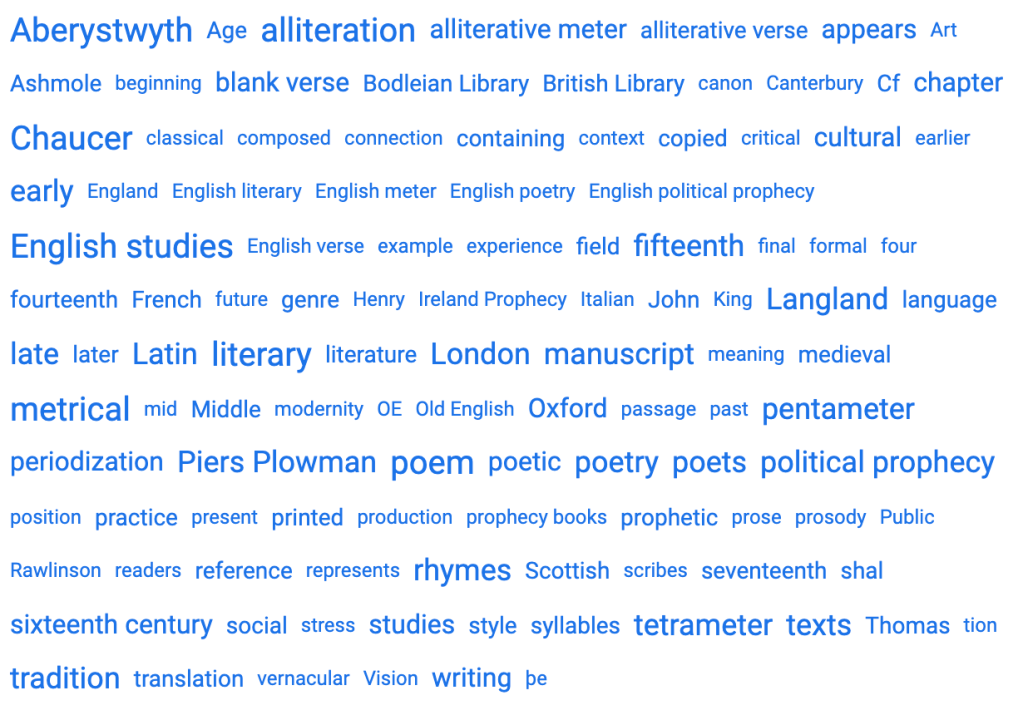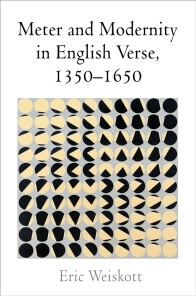My second monograph, Meter and Modernity in English Verse, 1350-1650, is published by the University of Pennsylvania Press (2020 for 2021). The book is partly based on archival research I conducted into manuscripts of English political prophecy held by rare book libraries in the United States and the United Kingdom.
In 2021, I gave a video interview to A Bit Lit about the book. Thanks to Andy Kesson for interviewing me.
from the inside flap:
What would English literary history look like if the unit of measure were not the political reign but the poetic tradition? The earliest poems in English were written in alliterative verse, the meter of Beowulf. Alliterative meter preceded tetrameter, which first appeared in the twelfth century, and tetrameter in turn preceded pentameter, the five-stress line that would become the dominant English verse form of modernity, though it was invented by Chaucer in the 1380s. While this chronology is accurate, Eric Weiskott argues, the traditional periodization of literature in modern scholarship distorts the meaning of meters as they appeared to early poets and readers.
In Meter and Modernity in English Verse, 1350-1650, Weiskott examines the uses and misuses of these three meters as markers of literary time, “medieval” or “modern,” though all three were in concurrent use both before and after 1500. In each section of the book, he considers two of the traditions through the prism of a third element: alliterative meter and tetrameter in poems of political prophecy; alliterative meter and pentameter in William Langland’s Piers Plowman and early blank verse; and tetrameter and pentameter in Chaucer, his predecessors, and his followers. Reversing the historical perspective in which scholars conventionally view these authors, Weiskott reveals Langland to be metrically precocious and Chaucer metrically nostalgic.
More than a history of prosody, Weiskott’s book challenges the divide between medieval and modern literature. Rejecting the premise that modernity occurred as a specifiable event, he uses metrical history to renegotiate the trajectories of English literary history and advances a narrative of sociocultural change that runs parallel to metrical change, exploring the relationship between literary practice, social placement, and historical time.
from the back cover:
“Eric Weiskott saves us from reading the history of English poetry as a narrative in which formal, thematic, and linguistic developments keep step across a progress of periods. Meter, in its own diversity—the asynchronous rise and fall of its many kinds—proves to be an ideal instrument for disaggregating the rates and durations of change across many domains.” —Jeff Dolven, author of Senses of Style
contents
Introduction. Modernity: The Problem of a History
Part I. Alliterative Meter, Tetrameter, Political Prophecy
1 English Political Prophecy: Coordinates of Form and History
2 The Age of Prophecy
3 The Ireland Prophecy and the Future of Alliterative Verse
4 Tetrameter: The Future of Alliterative Verse
5 Where Have All the Pentameter Prophecies Gone?
Part II. Alliterative Meter, Pentameter, Langland
6 Alliterative Meter and Blank Verse, 1540-1667
7 The Rhymelessness of Piers Plowman
8 Langland’s Meter and Blank Verse, 1700-2000
Part III. Tetrameter, Pentameter, Chaucer
9 Chaucer and the Problem of Modernity
10 Chaucer’s English Metrical Phonology: Tetrameter to Pentameter
11 The Age of Pentameter
Conclusion. From Archive to Canon
Appendix A. English Prophecy Books
Appendix B. Some Texts of English Verse Prophecies Not Noted in NIMEV
Appendix C. Compilers, Scribes, and Owners of Manuscripts Containing Political Prophecy
Appendix D. The Ireland Prophecy
endorsements
“This smart, inventive, and fastidiously researched book makes a case for a new relationship among meter, genre, and literary periodization in English poetry. […] Weiskott is a metricist and philologist of omnivorous learning. […] The new formalism exemplified by Weiskott requires far more thoughtfulness than the old New Criticism; it requires a far greater knowledge than the New Historicism […]. [S]cholarship at its most exact and provocative.” —Seth Lerer, author of Chaucer and his Readers and Literacy and Power in Anglo-Saxon Literature
“Weiskott’s Meter and Modernity does more than illuminate the histories of English metrics. Through his close readings of the literary critical and historical apparatuses that clouded our field’s understandings of metrics in the first place, Weiskott provides a powerful corrective to periodized, nationalist, and anglocentric studies of English literature and a generative vision of the field for scholars to take up.” —L. Bellee Jones-Pierce in Sixteenth Century Journal
“Meter and Modernity […] draws on an impressive range of scholarly resources: literary theory, bibliography and book history, political history, language history, and formal analysis in relatively equal measure.” —Molly Clark in Review of English Studies
“Working against a false symmetry between metrical and social history, Weiskott dislodges the attribution to Chaucer of a break between earlier metrical traditions and pentameter. […] Weiskott brings decades of metrical scholarship on prosody into focus to demystify pentameter’s prestige. With deep linguistic and archival knowledge, his book writes new plural histories of English verse forms for early periods in which there is little explicit poetics or meta-prosodic reflection. […] Weiskott thus successfully historicizes historical prosody, building bridges backward from its ‘Victorianist incarnation’ (p. 17). His book answers the pressing need for poetics to find rigorous methods for moving between time periods with truly divergent and non-‘modern’ literary cultures. […] Chapter 10 leaps out as our richest account of fourteenth-century accentual-syllabic metrics. Centring Chaucer’s radical deployment of the surprisingly exciting final -e, Weiskott marries archival, philological, metrical, and disciplinary awareness in what should be required reading for all medievalists and prosodists.” —Ben Glaser, author of Modernism’s Metronome: Meter and Twentieth-Century Poetics
“Eric Weiskott offers a stunning example of metrical inquiry at its finest. […] Gracefully blending Bourdieuan theory with linguistic and archival evidence, Weiskott recenters a marginalized genre—the political prophecy—among intersecting metrical cultures in England from the fourteenth to the seventeenth century. Exquisite codicological analysis complements precise philological reasoning in a probing audit of the methods of historical-literary scholarship. […] Meticulously researched and powerfully argued, this study will prove essential reading. It recovers the forest readers may mistake for mere trees; moreover, it recovers the trees as well.” —Nicholas Myklebust in Arthuriana
“[A] timely intervention in the intellectual project of rethinking the medieval-modern divide in literary and cultural history. […] Written with lucidity, intellectual breadth, and philological rigor, Meter and Modernity demonstrates that medieval and modern are inadequate terms to think about meter.” —Danila Sokolov, author of Renaisssance Texts, Medieval Subjectivities
“Eric Weiskott has written a searching, ambitious book with significant implications for our thinking about literary-historical time. […] [The book] lays out a new landscape of value for early English literature.” —Daniel Sawyer, author of Reading English Verse in Manuscript c.1350-c.1500
“[A]n endeavor that shines a light on verse practice and raises the stakes of metrical enquiry.” —Derek Attridge, author of The Experience of Poetry and The Rhythms of English Poetry
“The classic version of the story [of English meter] is: […]. Weiskott shows convincingly that it didn’t go down like that. [De klassieke versie van dat verhaal is: […]. Weiskott laat overtuigend zien dat het zo niet in elkaar zat.]” —Marc van Oostendorp in Neerlandistieck
reviews
Myra Stokes, Yearbook of Langland Studies 37 (2023): 181-85
Jones-Pierce, L. Bellee, Sixteenth Century Journal 53 (2022): 1150-52
Molly Clark, Review of English Studies 73 (2022): 387-89
Ben Glaser, Modern Language Review 117 (2022): 478-80
Nicholas Myklebust, Arthuriana 32.1 (2022): 103-104
Danila Sokolov, Renaissance Quarterly 75 (2022): 1113-15
Daniel Sawyer, English Studies 103 (2022): 378-80
Derek Attridge, Modern Philology 119 (2021): E100-103
Seth Lerer, Studies in the Age of Chaucer 43 (2021): 355-60
Marc van Oostendorp, Neerlandistieck 11 May 2021 [Dutch]
word cloud


You must be logged in to post a comment.